Coccineus Red Creeping Thyme Plant Addicts

OnlinePlantCenter 3 in. Coccineus Creeping Red Thyme PlantT1321CL The Home Depot
Pollinators friendly: Red creeping thyme is a favorite plant for bees, butterflies, and other pollinators due to its bright flowers. Versatility: Red creeping thyme is a popular choice for ground cover because of its low-growth habit. It grows to a height of only 2-3 inches (5-7 cm) and can spread up to 12 inches (30 cm), making it an excellent.

Photo of Red Creeping Thyme (Thymus praecox 'Coccineus Group') uploaded by Bonehead Corner
Growing Basics: Red creeping thyme is a versatile plant that thrives in sunny locations and is tolerant of various soil conditions. It is hardy in USDA zones 4-9. Spacing: When planting red creeping thyme, space the plants about 6-12 inches apart to allow for spreading. Watering: Red creeping thyme is drought-tolerant and requires minimal.
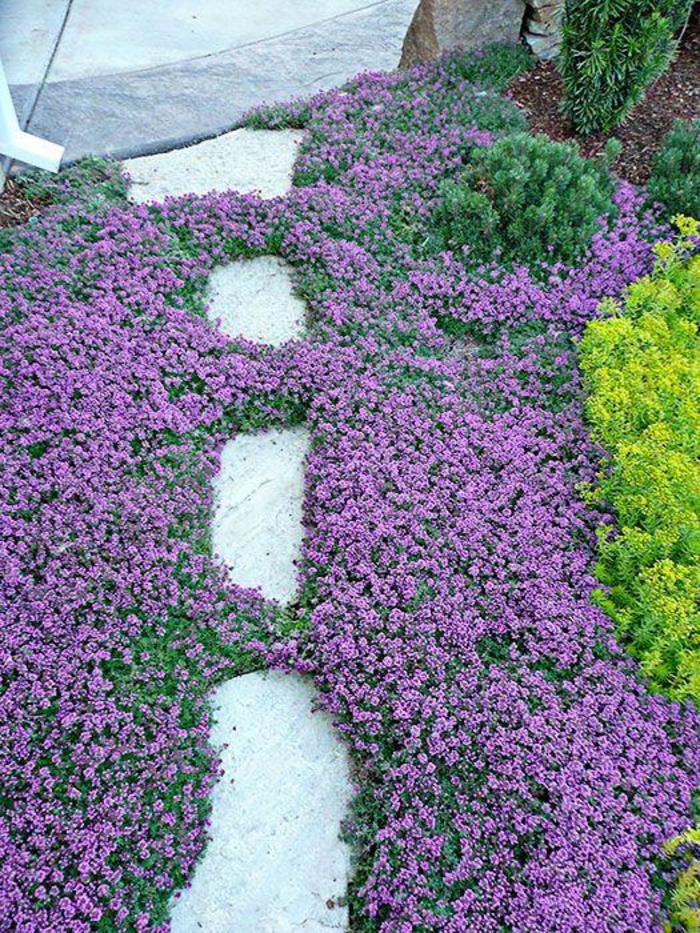
Creeping Thyme Faller Landscape
Red creeping thyme (Thymus serpyllum 'Coccineus') has pink flowers. It grows 3 inches tall and 12 to 18 inches wide and is hardy in zones 4 to 9. Wooly (or woolly) thyme (Thymus pseudolanuginosus) has pale pink flowers. It grows 3 inches tall and 3 to 12 inches wide, and is hardy in zones 5 to 8.
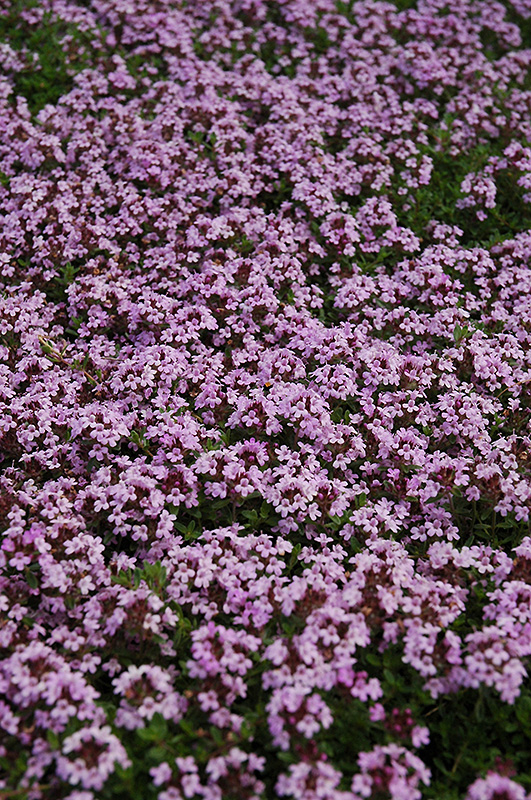
Red Creeping Thyme (Thymus praecox 'Coccineus') in Inver Grove Heights, Minnesota (MN) at Gertens
Planting creeping thyme from a container is as simple as digging a hole the same depth as the container, gently removing the plant from the pot, placing the root ball into the hole, filling soil around the roots, then giving the plant a good drink of water. Creeping thyme is easy to divide and spread throughout the yard.

Red Creeping Thyme Jackson & Perkins
Red Creeping Thyme prefers slightly alkaline to neutral soil with a pH of around 7.0. You can adjust the soil pH by adding lime if it's too acidic. Loosen the soil to a depth of about 6 inches and remove any weeds or debris. Dig holes for your thyme plants slightly larger than the plant's root balls.

Photo of the entire plant of Red Creeping Thyme (Thymus praecox 'Coccineus') posted by Legalily
Download the Temu App and start saving more today! Unleash incredible deals and coupons. Enjoy up to 90% off only today. Best deals in Australia. Worry-free post-sales guarantee!
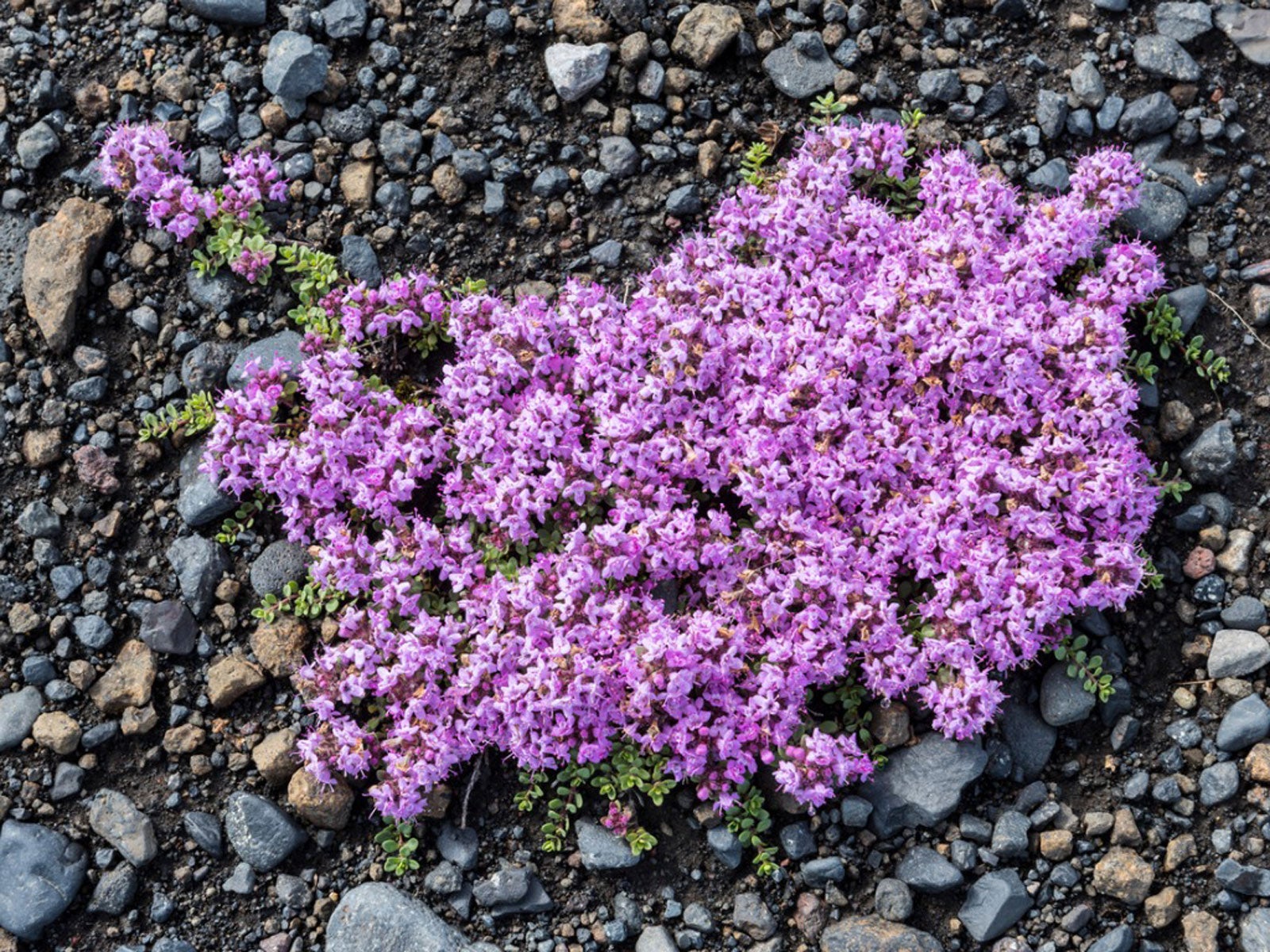
Creeping Thyme Plant Care How To Plant Creeping Thyme Ground Cover
Red creeping thyme also earns winning marks as a deer deterrent. The summer blooms of red creeping thyme range from purple to crimson and form a dense blanket of color above wide-spreading, low-growing 4-inch-tall foliage with a 12- to 18-inch spread. This density of growth helps suppress weeds and fill tricky gaps in the landscape.

Red Creeping Thyme Wilson Nurseries
Thymus serpyllum, known by the common names of Breckland thyme, Breckland wild thyme, wild thyme, creeping thyme, or elfin thyme, is a species of flowering plant in the mint family Lamiaceae, native to most of Europe and North Africa. It is a low, usually prostrate subshrub growing to 2 cm (1 in) tall with creeping stems up to 10 cm (4 in) long.

Creeping Thyme Plant Care How To Plant Creeping Thyme Ground Cover
Propagating creeping thyme from cuttings. Take young stem cuttings in early summer. The cuttings should be around 15 cm long and cut just below a leaf node. Strip off the bottom leaves so that there are only a few leaves at the top. Place the cut stems into small pots or a seedling tray filled with seed-raising mix.
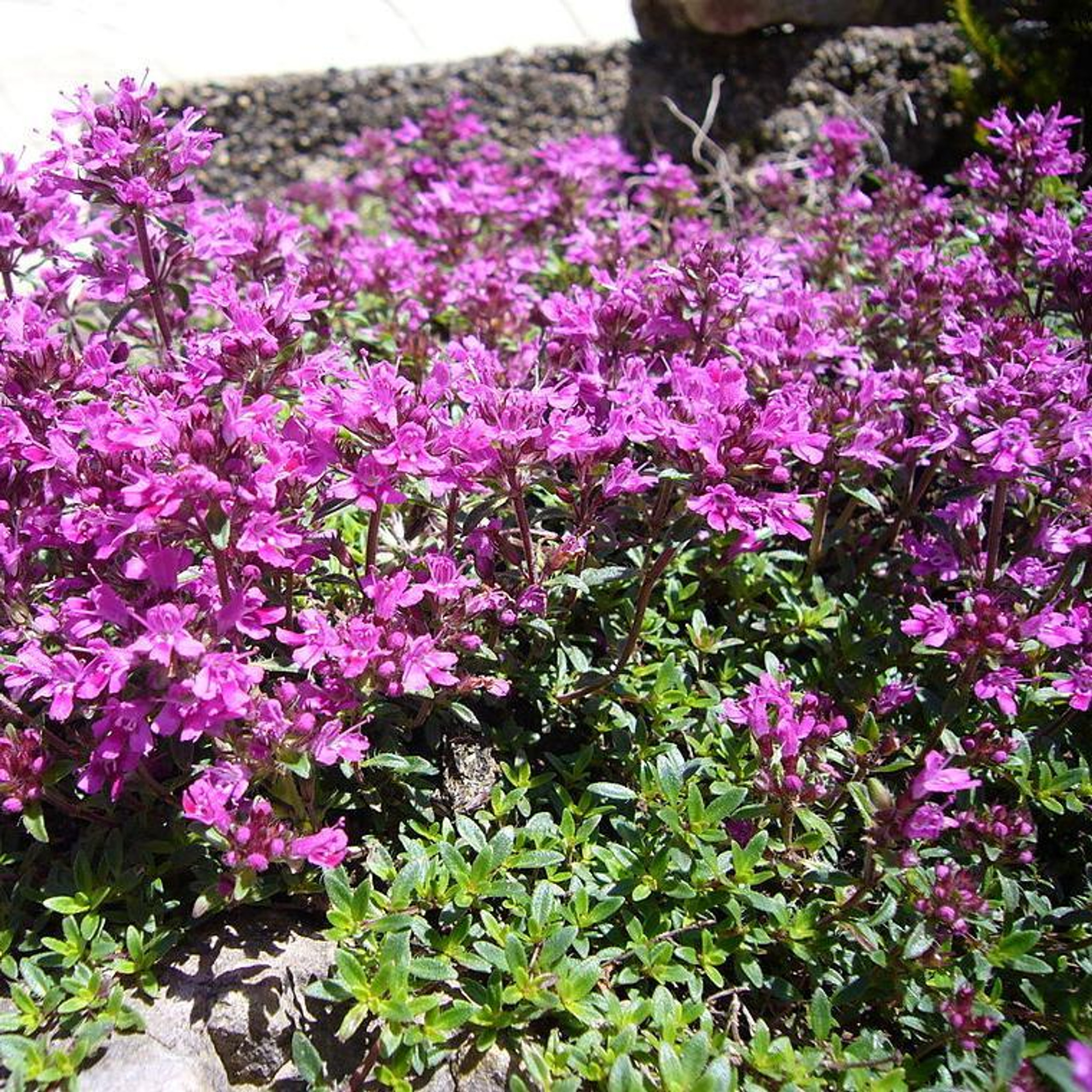
Thymus serpyllum coccineus 'Thyme Creeping Red' Buy Herb Plants
Thymus serpyllum Coccineus. Very dense foliage and masses of pink to red flowers Thymus serpyllum Coccineus is commonly called Red Creeping Thyme. This is a very low growing creeping variety, aromatic foliage and attractive both when in flower and through the year. The foliage itself is small and rounded, the flowers appear above on short stems.

Red Creeping Thyme Wilson Nurseries
Red creeping thyme has a delicate pinkish-purple hue to its flowers, but spends most of the year a grassy-green mound, growing in distinct domed clusters. 4. Caraway thyme (Thymus herba-barona) Caraway thyme is a very specific species of thyme, native to Majorica and Corsica. Its soft papery foliage is perfect for cooking into sauces and has.

Creeping Thyme Magic Carpet Seeds Thymus Serpyllum 100Seeds Etsy 1000 Creeping thyme, Red
To replace a lawn with thyme, first remove all the grass by stripping off the top layer of grass and soil, then cultivate the ground to ensure it's weed-free. Thyme is shallow rooting so just cultivate the top 15cm or so of ground. The number of thyme plants required depends on the size of plant purchased. Plant plug plants around 10cm apart.

Red Creeping Thyme Thymus praecox 'Coccineus'
Red creeping thyme, scientifically known as Thymus praecox 'Coccineus,' is a perennial herbaceous plant characterized by its small dark-pink to magenta-red flowers, aromatic dark-green leaves, and woody stems. Often referred to as "mother of thyme," this low-growing shrub reaches a height of 3 inches (7.5 cm) and spreads up to 12 inches.

Red Creeping Thyme Great Garden Plants
Thymus serpyllum. Grow creeping thyme in full sun and well-drained soil in a variety of sites including rockeries, raised beds, border edges, window boxes, living walls, green roofs, and shallow pots. Thymes grow best in soil with a neutral to alkaline pH. Creeping thyme is low-growing and spreading, growing a maximum of 5-10cm high and 20-30cm.

Thymus serpyllum coccineus 'Thyme Creeping Red' Buy Herb Plants
With shiny small green leaves forming a dense tight mat, this form of wild thyme features bright pink flowers in small stems. Flowering is from mid summer and looks great between pavers or as a feature in the garden. H: 10 W: 40. Frost tolerance: hardy. Water use: Low Perennial.
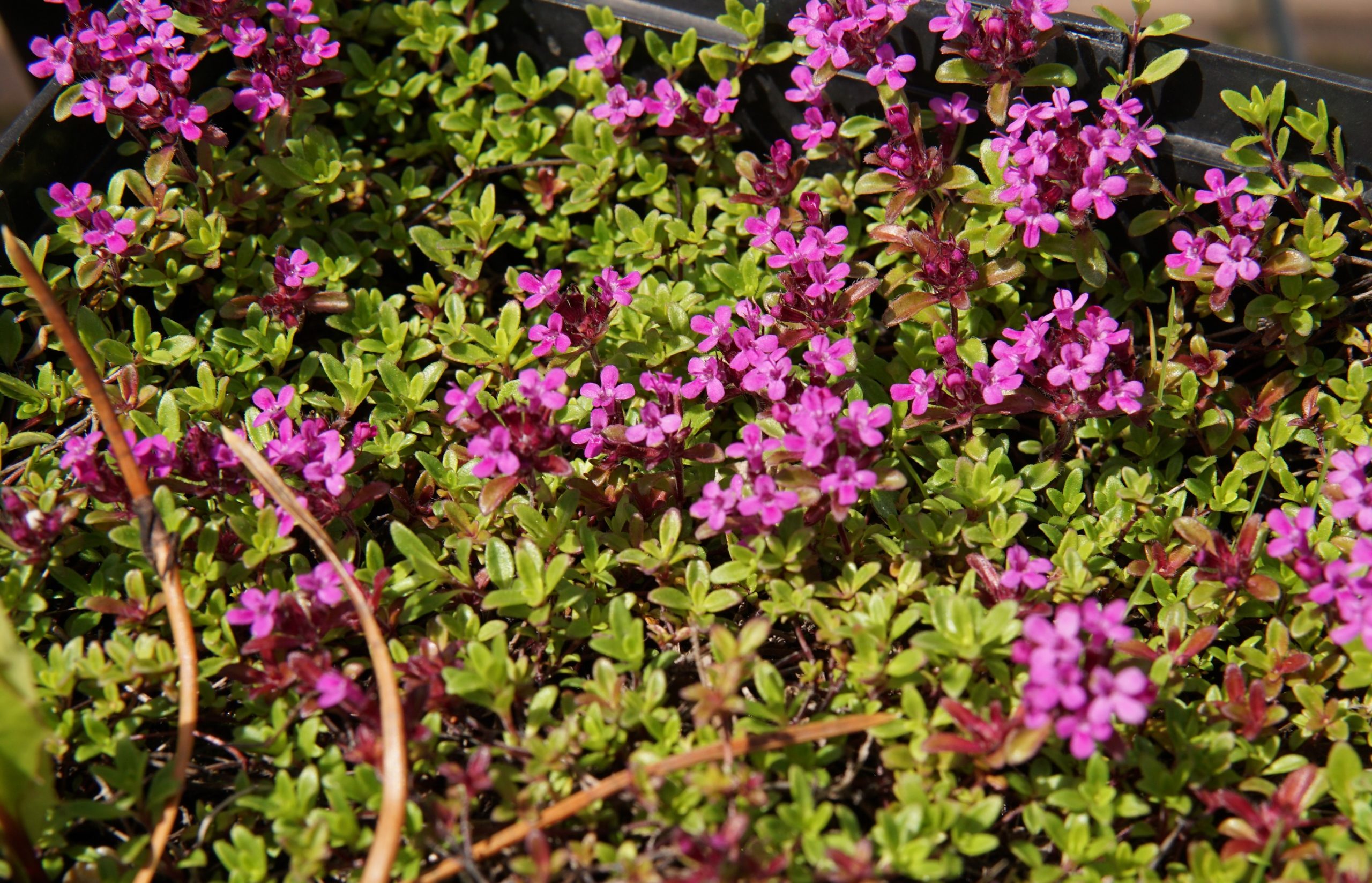
Red Creeping Thyme • Kiwi Nurseries Ltd
Red creeping thyme requires full sun to grow and bloom. Plant in well-prepared sandy loam with good drainage. Do not overwater and allow it to dry between waterings. Frequent pruning is essential to maintain this stunning ground cover. Red creeping thyme is known to attract bees and butterflies.